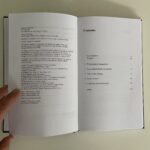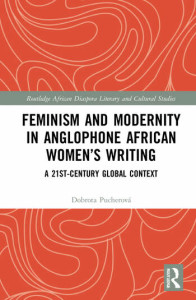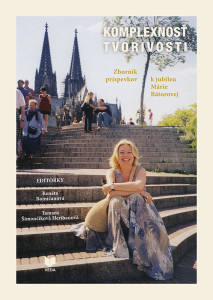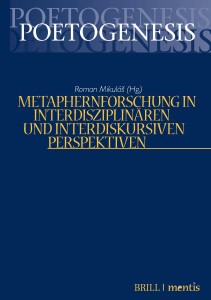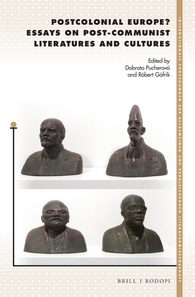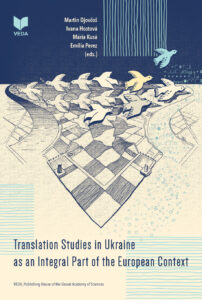 The violence and inhumanity of Russia’s war in Ukraine, with hospitals under fire, innocent civilians mercilessly killed, and a possible threat of nuclear war, put a definitive end to the false feeling of security enjoyed by Europe since the Yugoslav wars. A war of such scale, taking place in the twenty-first century and on the European continent, cannot be perceived as anything other than a direct assault on core values of democracy, freedom, and human rights. Thus, maintaining a friendly dialog with people around the world is now more important than ever to prevent further tragedies. Translation in all its forms is the key practice that can facilitate mutual understanding, which is vital if we are to hand down the planet to further generations in a habitable state.
The violence and inhumanity of Russia’s war in Ukraine, with hospitals under fire, innocent civilians mercilessly killed, and a possible threat of nuclear war, put a definitive end to the false feeling of security enjoyed by Europe since the Yugoslav wars. A war of such scale, taking place in the twenty-first century and on the European continent, cannot be perceived as anything other than a direct assault on core values of democracy, freedom, and human rights. Thus, maintaining a friendly dialog with people around the world is now more important than ever to prevent further tragedies. Translation in all its forms is the key practice that can facilitate mutual understanding, which is vital if we are to hand down the planet to further generations in a habitable state.
The collection of studies entitled Translation Studies in Ukraine as an Integral Part of the European Context contains fifteen studies in English and German and is divided into five thematic parts: Thoughts and Reflections; On Historical Justice in Translation Studies; On Methodological Aspects of Translation; On Linguistic Aspects of Translation; On Trauma and Manipulation. The sections open with papers by leading academics in the field of translation studies. This volume is a collection of papers from the eponymous conference held in Bratislava on May 12–13, 2022. It was attended by scholars with immediate ties with Ukraine, and numerous representatives from all major translation schools in Ukraine and also translation studies experts from all around the world.
We found it our duty to help disseminate the knowledge about translation research in Ukraine and, by doing so, reinforce our deepest conviction that Ukraine shares European values and is – and has always been – an integral part of Europe.
The publication was produced within the project VEGA 2/0166/19 Preklad ako súčasť dejín
kultúrneho procesu III. Preklad a prekladanie – texty, osobnosti, inštitúcie v interdiscipli-
nárnych a transdisciplinárnych vzťahoch/Translation as part of the cultural process history III. Translation and translating – texts, personalities, institutions in inter- and transdisciplinary relations.
Full text is HERE.
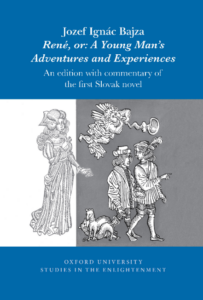 At the beginning of this year, a unique publication was released in the prestigious Oxford University Studies in the Enlightenment series, edited by our colleague Dobrota Pucherová and Erika Brtáňová from the Institute of Slovak Literature of the Slovak Academy of Sciences. The publication, Jozef Ignác Bajza, René, or: A Young Man’s Adventures and Experiences. An edition with commentary of the first Slovak novel, is the very first English translation of the first Slovak novel. Bajza’s novel was translated by David Short, an acclaimed British translator of Czech and Slovak. In addition to the translation, the book includes an introduction, extensive annotations, an illustrated appendix, and two studies that place the work René mláďenca príhodi a skúsenosťi (1783–1785) in the context of the European Enlightenment.
At the beginning of this year, a unique publication was released in the prestigious Oxford University Studies in the Enlightenment series, edited by our colleague Dobrota Pucherová and Erika Brtáňová from the Institute of Slovak Literature of the Slovak Academy of Sciences. The publication, Jozef Ignác Bajza, René, or: A Young Man’s Adventures and Experiences. An edition with commentary of the first Slovak novel, is the very first English translation of the first Slovak novel. Bajza’s novel was translated by David Short, an acclaimed British translator of Czech and Slovak. In addition to the translation, the book includes an introduction, extensive annotations, an illustrated appendix, and two studies that place the work René mláďenca príhodi a skúsenosťi (1783–1785) in the context of the European Enlightenment.
